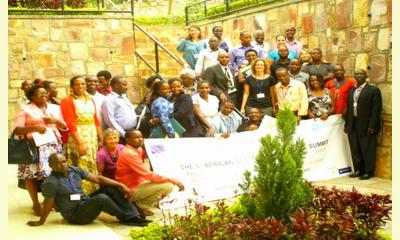|
|
Rwanda: 3rd African Alliance for Peace Summit
un article par Shalom Educating for Peace
"Promoting Peace Education in Our Communities" was
the theme of the third African Alliance for Peace
Summit. This Summit, hosted by Shalom Educating
for Peace and in partnership with the Institute of
Justice and Reconciliation (IJR), took place in
Kigali, Rwanda from the 16th to the 19th of
February 2014.

Participants of the 3rd African Alliance for Peace Summit
click on photo to enlarge
The Summit brought together 62 participants from
various organisations and 11 countries, each with
their own character and agenda but with one common
goal of exploring how we can promote peace
education in our communities. The event
highlighted participants striving for an Africa
that moves from handling conflict with violence to
one that solely use peace-building as the conduit
of security – a vision of moving from action to
prevention.
Participants shared their belief that peace
education should involve the teaching of African
values, allowing peace-building to become a unique
and beautiful structuring of a new history for the
African continent. The event was designed to
enhance awareness and understanding of the various
models of peace education and infrastructures for
peace, with a particular focus on home-grown
approaches.
The Summit was preceded by a pre-summit training
focused on conflict analysis; peace and
nonviolence theory; monitoring and evaluation of
peace programmes; and an experiential training in
Alternative to Violence Programme (AVP). The pre-
summit event witnessed an adoption of Galtung‘s
value of "if you want peace, make peace." The AVP
training fostered in participants the principles
of transforming power towards peaceful
relationships and a commitment of handing over
non-violent principles, communication, practices
and strategies to the next generation.
Participants continually invested in the
understanding of peace with the hope that it will
grow – grow in our minds, in our communities and
on the African continent. Participants established
that in order to be impactful we need a joining of
ideas, resources, experience and vision – moving
as a diverse whole towards education for peace in
our communities, infrastructures for peace in our
countries and the valuing and practice of peace on
our continent
The third African Alliance for Peace (AAP) Summit
also witnessed some strategic events including the
drafting of the Kigali Declaration to be presented
to authorities in Rwanda, the members of the
African Union (AU) and to various key stakeholders
in the countries represented at the Summit. Also
the event allowed for a meeting of the members of
the AAP and the election of a new steering
committee for the alliance.
The event also marked the launch of acknowledging
peacebuilders in Africa, by presenting Geoff
Harris with a peace award to honour him for the
establishment of a Peace Studies Department at a
tertiary institution in South Africa and his
impact on Masters and Doctoral students from
across Africa. In 2016, at the fourth AAP Summit
to be hosted in Kenya, this award will be
presented to a journalist illustrating exceptional
efforts towards peace in Africa.
(Thank you to the Global Campaign for Peace
Education for alerting us to this article.)
|








|
DISCUSSION
Question(s) liée(s) à cet article:
How can we develop the institutional framework for a culture of peace? ,
* * * * *
Commentaire le plus récent:
This discussion question applies to the following articles:
100th Anniversary of the Peace Palace in The Hague
Parliaments Preparing for International Day of Democracy
Sixth Summit of Global Alliance for Ministries and Infrastructures of Peace
Global Alliance for Ministries and Infrastructures for Peace (GAMIP) 2013 Switzerland Summit
Ghana: Most Rev. Prof Asante: I have a dream for peace
Rwanda: 3rd African Alliance for Peace Summit
Union Interparlementaire célèbre 125 années d’action parlementaire internationale au service de la paix et de la démocratie
Inter-Parliamentary Union to mark 125 years of global parliamentary action on peace and democracy
One billion signatures for peace
Civil society has a critical role to play in ensuring lasting peace in Latin America: Tunisian Nobel Peace prize winner Ali Zeddini, speaking in Colombia
Let’s mark Canada’s 150th birthday by establishing a Department of Peace
For articles since 2016, click here .

|
|









